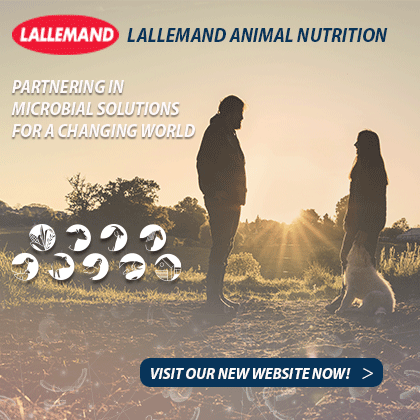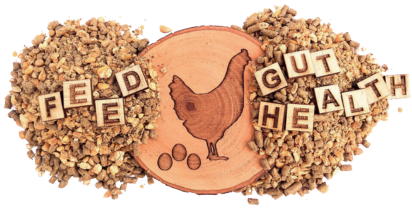29 Mar 2024
ADDRESSING CHRONIC INTESTINAL INFLAMMATION AND OXIDATIVE STRESS IN POULTRY: CHALLENGES AND SOLUTIONS

In the poultry industry, gut health management is a critical factor for successful poultry production. Gut health is closely related to production performance, feed efficiency and disease resistance.


However, two interconnected problems that negatively affect gut health, and thus poultry performance, are chronic intestinal inflammation and oxidative stress. In this article, we will explore in depth how these phenomena affect poultry and what strategies can be implemented to mitigate their effects.

Chronic Intestinal Inflammation in Poultry

Chronic intestinal inflammation is a complex process that can be triggered by a variety of factors, such as diet, stress, infections, and the presence of pathogens. In poultry, this condition can manifest as enteritis, which is inflammation of the small intestine, or colitis, which affects the large intestine.
The consequences of chronic intestinal inflammation are significant. On the one hand, it can compromise the integrity of the intestinal barrier, leading to increased permeability and infiltration of toxins and pathogens into the bloodstream, triggering systemic immune responses. In addition, chronic intestinal inflammation can interfere with nutrient absorption, resulting in decreased growth and performance of the birds.

Oxidative Stress in Poultry
Oxidative stress is another crucial factor affecting gut health in poultry. This phenomenon occurs when there is an imbalance between the production of reactive oxygen species (ROS) and the body’s antioxidant capacity to neutralize them.
ROS include free radicals such as superoxide and hydrogen peroxide, which can damage cell membranes, proteins, and DNA.

In poultry farming, intestinal oxidative stress can be caused by several factors, such as inadequate feed, disease, environmental heat, transport, and stressful management practices.
| This stress can compromise the health and function of enterocytes, resulting in decreased nutrient absorption and increased susceptibility to disease. |
Impact on Poultry Performance
Both chronic intestinal inflammation and oxidative stress have a significant negative impact on poultry performance. Affected birds may experience decreased growth rate, increased feed conversion and increased incidence of disease.
 In addition, the quality of meat and poultry products may be compromised due to inflammation and oxidative stress, affecting the profitability of poultry production.
In addition, the quality of meat and poultry products may be compromised due to inflammation and oxidative stress, affecting the profitability of poultry production.

Strategies to Mitigate Chronic Intestinal Inflammation and Oxidative Stress
To effectively address these problems, it is crucial to implement comprehensive gut health management strategies in poultry.
Some measures that can help mitigating chronic intestinal inflammation and oxidative stress include:
 1- Improving dietary quality: Providing a balanced, high-quality diet is critical to maintaining gut health. This includes the use of highly digestible ingredients, the addition of prebiotics and probiotics to promote a healthy gut microbiota, and the elimination of additives or ingredients that may be irritating to the gut.
1- Improving dietary quality: Providing a balanced, high-quality diet is critical to maintaining gut health. This includes the use of highly digestible ingredients, the addition of prebiotics and probiotics to promote a healthy gut microbiota, and the elimination of additives or ingredients that may be irritating to the gut.
 2- Stress management: Reduce stress in the birds through good management practices, such as controlling the birds’ density, providing a comfortable temperature and ventilation and avoiding abrupt changes in the environment and ensuring free access to water and feed. In addition, it is important to implement effective vaccination and biosecurity programs to prevent diseases that can trigger stress and cause intestinal inflammation.
2- Stress management: Reduce stress in the birds through good management practices, such as controlling the birds’ density, providing a comfortable temperature and ventilation and avoiding abrupt changes in the environment and ensuring free access to water and feed. In addition, it is important to implement effective vaccination and biosecurity programs to prevent diseases that can trigger stress and cause intestinal inflammation.
 3- Antioxidant supplementation: The addition of antioxidants to the diet, such as vitamins E and C, selenium and natural polyphenols, can help neutralizing free radicals and reducing oxidative stress in the gut.
3- Antioxidant supplementation: The addition of antioxidants to the diet, such as vitamins E and C, selenium and natural polyphenols, can help neutralizing free radicals and reducing oxidative stress in the gut.
 4- Use of natural additives: Some natural additives, such as medicinal plant extracts and organic acids, have been shown to have anti-inflammatory and antioxidant properties among others properties that can benefit the intestinal health of poultry.
4- Use of natural additives: Some natural additives, such as medicinal plant extracts and organic acids, have been shown to have anti-inflammatory and antioxidant properties among others properties that can benefit the intestinal health of poultry.
 5- Regular monitoring: Regular monitoring of the intestinal health of poultry through fecal analysis, assessment of the intestinal epithelium and performance parameters in general can help to identify problems early and take corrective action quickly to avoid higher economic impact.
5- Regular monitoring: Regular monitoring of the intestinal health of poultry through fecal analysis, assessment of the intestinal epithelium and performance parameters in general can help to identify problems early and take corrective action quickly to avoid higher economic impact.


Chronic intestinal inflammation and oxidative stress represent significant challenges in modern poultry production.
However, with a holistic approach that addresses both risk factors and mitigation strategies, it is possible to improve the intestinal health of poultry and optimize their production performance.
 By prioritizing gut health, poultry producers can ensure a high quality feed supply and contribute to animal welfare in the poultry industry.
By prioritizing gut health, poultry producers can ensure a high quality feed supply and contribute to animal welfare in the poultry industry.

NuxaSan 500™ is a potent blend of 100% bioactive components, including polyphenols, tannins, flavonoids, terpenoids, and saponins, renowned for their efficacy in alleviating the detrimental effects of coccidia on the epithelium. Moreover, NuxaSan 500™ is rich in compounds known for their antioxidant and anti-inflammatory properties, capable of attenuating the oxido-inflammatory cycle induced by the imbalance resulting from coccidial infection.
In this way, NuxaSan 500™ is a suitable ingredient to take into account on the strategy to support gut mucosa integrity, intestinal osmotic balance and microbiota homeostasis, always looking for better intestinal health, performance, and animal welfare.

Gerardo Villalobos Saume, M.V., Msc | Nuproxa Switzerland ltd.
